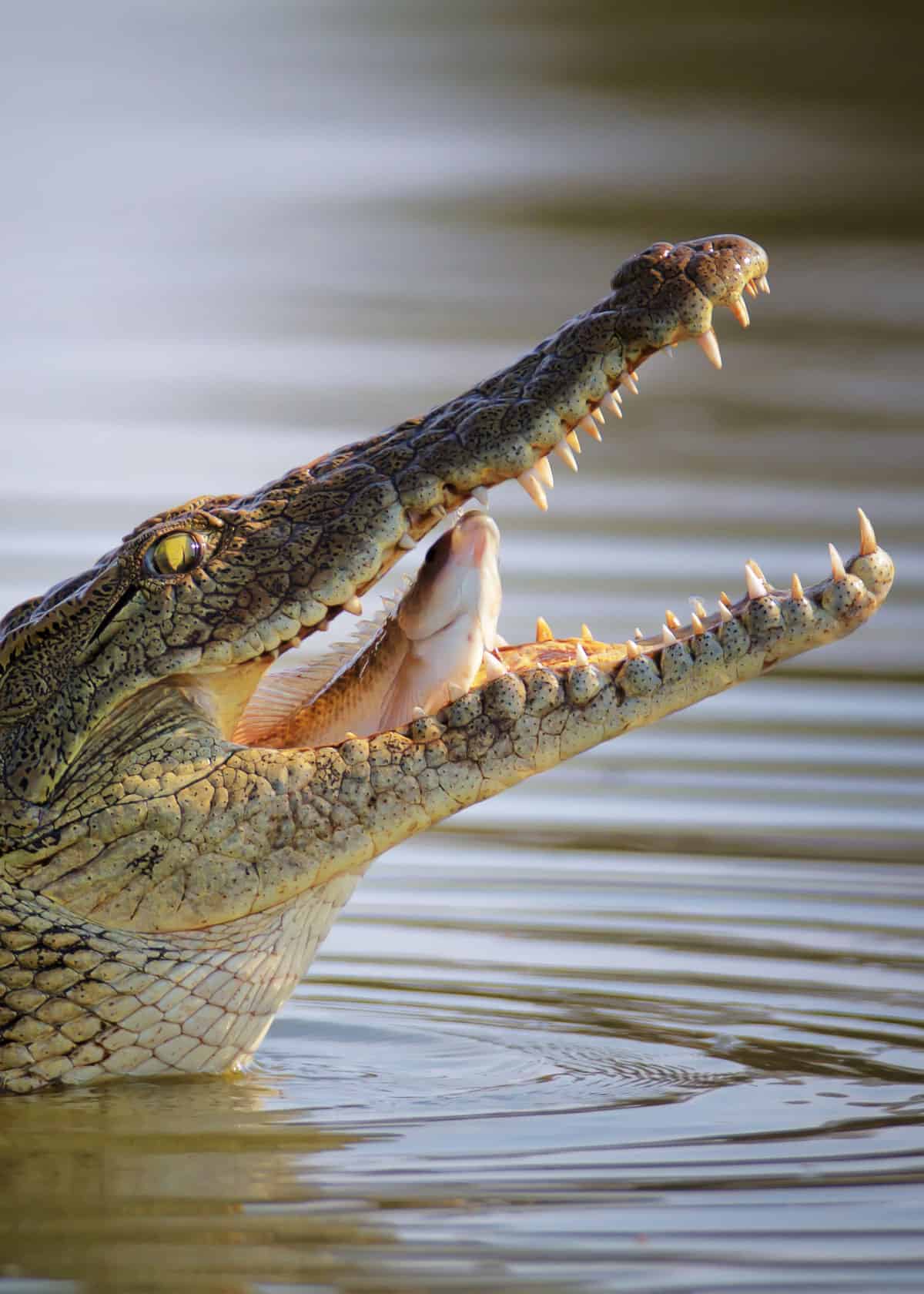Do Nile Crocodiles Eat Humans? Unveiling The Truth Behind The Bite
Have you ever wondered if those big toothy reptiles lurking in Africa's rivers are actually man-eaters? Well, buckle up because we're diving into the world of Nile crocodiles and their reputation for dining on humans. This isn't just a question of curiosity—it's a matter of survival for those who live near these water beasts. So, let's get ready to uncover some shocking truths and debunk a few myths along the way.
You've probably seen them on TV shows or heard stories from travelers about how dangerous Nile crocodiles can be. But is it all hype, or is there some real danger lurking beneath those calm waters? As we explore this topic, you'll discover why these creatures have earned their notorious reputation and how they interact with humans in the wild.
Our journey will take us through the biology, behavior, and history of Nile crocodiles. We'll also discuss the risks they pose to humans and what you can do to stay safe if you ever encounter one. By the end of this article, you'll have a clearer understanding of whether Nile crocodiles really do eat humans and what that means for people living in their habitats.
Read also:Decatur Daily Obituaries Decatur Alabama A Heartfelt Journey Through Life And Legacy
Understanding the Nile Crocodile
Before we dive into the juicy details about their dietary habits, let's take a moment to understand who—or rather, what—these Nile crocodiles really are. These ancient creatures have been around for millions of years, and they haven't changed much since the time of the dinosaurs. They're perfectly adapted to their environment, making them one of the most successful predators on the planet.
Nile crocodiles are native to Africa and can be found in rivers, lakes, and wetlands throughout the continent. They're known for their powerful jaws, stealthy hunting techniques, and impressive size. Adult males can grow up to 16 feet long and weigh over 500 pounds, making them a force to be reckoned with in the wild.
Key Characteristics of Nile Crocodiles
- Huge Jaws: Their bite force is one of the strongest in the animal kingdom, capable of exerting over 3,700 pounds of pressure per square inch.
- Camouflage Experts: Their greenish-brown skin helps them blend seamlessly into their surroundings, making them almost invisible in the water.
- Swimming Masters: Despite their size, they're incredibly agile in the water, reaching speeds of up to 10 miles per hour.
- Long Lifespan: Nile crocodiles can live for 70 to 100 years in the wild, giving them plenty of time to perfect their hunting skills.
Do Nile Crocodiles Eat Humans? The Stats Speak
Now, let's get to the heart of the matter. Do Nile crocodiles actually eat humans? The short answer is yes, but it's not as straightforward as you might think. While these creatures are opportunistic predators, they don't actively hunt humans as their primary food source. However, they do attack and consume humans when the opportunity arises.
According to the Food and Agriculture Organization (FAO) of the United Nations, Nile crocodiles are responsible for hundreds of attacks on humans each year. In some regions, like Mozambique and Tanzania, the number of attacks can reach over 300 annually. These attacks often occur near water sources where people go to fetch water, fish, or bathe.
Why Do They Attack Humans?
Nile crocodiles attack humans for a variety of reasons, but it mostly boils down to opportunity and territory. Here are some of the main reasons:
- Hunger: When food is scarce, crocodiles may turn to humans as an easy meal.
- Territorial Behavior: Crocodiles are highly territorial and may attack humans who venture too close to their domain.
- Misidentification: Sometimes, crocodiles mistake humans for prey, especially if they're swimming or wading in the water.
How Dangerous Are Nile Crocodiles to Humans?
While Nile crocodiles are undeniably dangerous, it's important to put their threat level into perspective. Compared to other wild animals, such as lions or elephants, crocodile attacks are relatively rare. However, when they do happen, they're often fatal. The combination of their powerful bite, stealthy approach, and sheer size makes them incredibly deadly.
Read also:Mnt Goat Dinar Update The Ultimate Guide For Investors And Enthusiasts
One of the reasons Nile crocodiles are so dangerous is their hunting technique. They use a method called the "death roll," where they grab their prey with their jaws and spin violently in the water to dismember it. This makes escape nearly impossible for any victim caught in their grasp.
Survival Rates of Crocodile Attacks
Unfortunately, the survival rate of a Nile crocodile attack is extremely low. According to a study published in the Journal of Herpetology, only about 30% of victims survive an attack. Even if someone manages to escape, they often suffer severe injuries that can be life-threatening.
The History of Human-Crocodile Encounters
Humans and crocodiles have shared the same habitats for thousands of years, and their interactions have been documented in various forms throughout history. Ancient Egyptians revered crocodiles as sacred creatures, while other cultures viewed them with fear and superstition.
In modern times, the relationship between humans and crocodiles has become more complex. As human populations grow and encroach on crocodile habitats, the likelihood of encounters increases. This has led to more frequent attacks and a growing concern for both human safety and crocodile conservation.
Famous Crocodile Attacks in History
- The Ruzizi River Massacre: In 1987, a group of over 500 people were attacked by Nile crocodiles while crossing the Ruzizi River in Burundi. It's considered one of the deadliest crocodile attacks in recorded history.
- The Mwanza Incident: In 2017, a crocodile attack in Tanzania left 10 people dead, highlighting the ongoing threat these creatures pose in rural areas.
Preventing Crocodile Attacks
While Nile crocodiles are dangerous, there are steps you can take to reduce the risk of an attack. If you're traveling to areas where crocodiles are known to live, it's essential to be aware of your surroundings and follow safety guidelines.
Tips for Staying Safe
- Avoid Swimming in Crocodile-Infested Waters: This might seem obvious, but it's the most effective way to prevent an attack.
- Stay Away from the Water's Edge: Crocodiles often lurk just beneath the surface, waiting for an opportunity to strike.
- Be Cautious at Night: Crocodiles are more active during the night, so avoid being near water after dark.
The Role of Conservation in Human-Crocodile Conflicts
Conservation efforts play a crucial role in managing human-crocodile conflicts. By protecting crocodile habitats and educating local communities, we can reduce the likelihood of attacks while ensuring the survival of these incredible creatures.
One successful conservation program is the Crocodile Management Plan in South Africa, which focuses on monitoring crocodile populations, educating the public, and implementing safety measures in affected areas. Programs like these are essential for maintaining a balance between human needs and wildlife preservation.
Debunking Myths About Nile Crocodiles
There are plenty of myths and misconceptions about Nile crocodiles, and it's important to separate fact from fiction. Here are a few common myths and the truth behind them:
- Myth: All Crocodiles Are Aggressive: While Nile crocodiles can be aggressive, not all species of crocodiles pose a threat to humans.
- Myth: Crocodiles Always Hunt in Packs: Nile crocodiles are solitary hunters and rarely work together to catch prey.
The Future of Human-Crocodile Coexistence
As human populations continue to grow and encroach on crocodile habitats, the challenge of coexistence becomes increasingly important. Finding ways to live alongside these powerful predators without compromising safety or conservation goals is a complex but necessary task.
Technology and innovation may hold the key to solving this issue. For example, researchers are exploring the use of drones and acoustic deterrents to monitor crocodile activity and warn people of potential dangers. These advancements could help reduce the number of attacks while protecting crocodile populations.
Conclusion
So, do Nile crocodiles eat humans? The answer is a resounding yes, but it's important to remember that these attacks are relatively rare and often preventable. By understanding the behavior and habits of these incredible creatures, we can take steps to reduce the risk of encounters and promote peaceful coexistence.
We encourage you to share this article with your friends and family, especially if you're planning a trip to Africa or any other region where Nile crocodiles live. Remember, knowledge is power, and the more we know about these fascinating animals, the better equipped we are to protect ourselves and them.
Table of Contents
- Understanding the Nile Crocodile
- Do Nile Crocodiles Eat Humans? The Stats Speak
- How Dangerous Are Nile Crocodiles to Humans?
- The History of Human-Crocodile Encounters
- Preventing Crocodile Attacks
- The Role of Conservation in Human-Crocodile Conflicts
- Debunking Myths About Nile Crocodiles
- The Future of Human-Crocodile Coexistence


